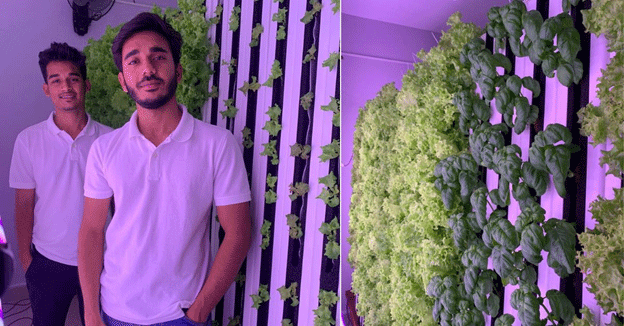As traditional farming struggles to cope with climate change, water scarcity, and soil degradation, innovative solutions are emerging to address these pressing issues. One such solution is hydroponics, a method that allows plants to grow in nutrient-rich water without soil. Pioneering this approach, engineers Calvin Aranha and Farish Anfal from Udupi, Karnataka, have integrated Artificial Intelligence (AI) into hydroponic systems to create a revolutionary farming model with promising results.
- The Genesis of Krop AI
Calvin Aranha and Farish Anfal, both engineering graduates from Mangalore Institute of Technology and Engineering (MITE), embarked on a journey to revolutionize agriculture. Farish’s experience in the seafood industry exposed him to the severe challenges faced by farmers, including soil fertility issues and the impact of climate change. Recognizing the need for more sustainable practices, he, along with Calvin, decided to focus on hydroponics enhanced by AI.
Their venture, Krop AI, started in 2021 after Calvin left his corporate job and the duo invested their savings to develop a prototype. Krop AI’s mission is to make farming more resilient and profitable by integrating advanced technology into hydroponic systems.
- AI-Enhanced Hydroponics: The Technology
Krop AI’s hydroponic system employs cutting-edge technology to optimize plant growth. Their setup features 3D-printed pipes for vertical farming, allowing precise control over environmental factors such as light spectrum, temperature, and humidity. This controlled environment ensures optimal conditions for plant growth while significantly reducing water usage and operational costs.
The system uses specialized spectrum lights that mimic sunlight but are tuned to the exact wavelengths required for photosynthesis. This innovation not only conserves 95% of water compared to traditional methods but also lowers operational costs by 50%. For instance, growing a kilogram of strawberries costs about Rs 300 in their AI-enabled system, compared to Rs 800 using conventional methods.
- Impact and Growth
Krop AI’s technology has already made significant strides. The startup has built farms for approximately ten agri-entrepreneurs and companies, with each setup costing Rs 5 lakh and capable of growing 500 lettuce plants. Their efforts have not gone unnoticed; they won the Karnataka Government’s Idea2POC/Elevate/2023 grant in the biotech sector and are incubated with the AIC Nitte incubation centre under the Startup India scheme.
In their first year, Calvin and Farish generated Rs 50 lakh in revenue, achieving a 40% gross profit on their farm station manufacturing. With projected revenues of Rs 3 crores for the current year, their success underscores the potential of AI-driven hydroponics to transform agriculture.
- Future Prospects
Looking ahead, Krop AI aims to expand its reach to small and medium-income growers, enabling them to benefit from advanced hydroponic technology. Their AI-enabled system offers a viable solution for overcoming the limitations of traditional farming, providing a path towards more sustainable and profitable agricultural practices.
Calvin Aranha and Farish Anfal’s Krop AI is a testament to the transformative power of technology in agriculture. By combining AI with hydroponics, they have created an efficient, cost-effective farming solution that addresses critical issues such as water scarcity and soil degradation. As they continue to innovate and scale their technology, Krop AI has the potential to revolutionize farming practices and enhance food security in India and beyond.












